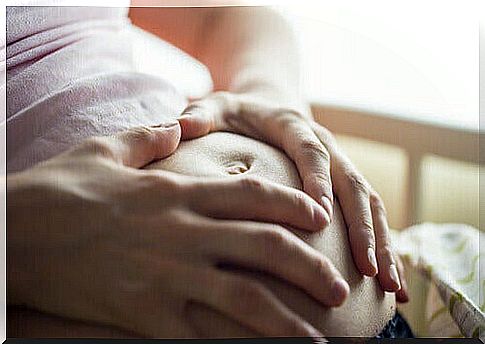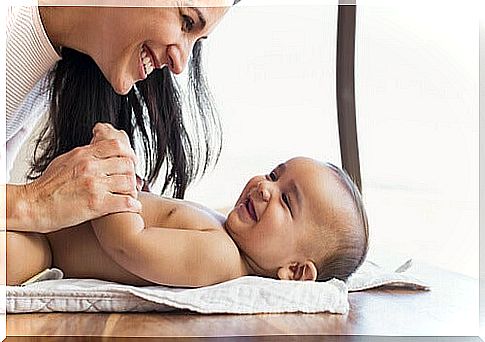7 Tips To Promote A Relaxed Childhood

Stress is not age-dependent. This is why our children can also be stressed even before they are born. During childhood, triggers are often circumstances that, although to adults they may seem irrelevant, they are a real challenge to them. Hence the importance of promoting a relaxed childhood to ensure an anxieties-free adult life.
The separation from parents when going to school, a reprimand from the teacher, a fight with friends at recess, a punishment for not eating what is on the plate or sleeping alone. These are small problems that the child must solve on a daily basis with the available resources… which are still scarce. The little ones have not yet reached a sufficient maturational development to deal with this stress.
stress free pregnancy
Michel Odent, a well-known French obstetrician, has devoted most of his life to studying how pregnancy and childbirth influence a child’s emotional development. This doctor maintains that the pregnant mother’s affective state influences the child more in the long term than the child’s emotional state during its first year of life.
With this statement, we realize that any external agent that can generate stress for the mother has a greater or lesser impact on the fetus.

During pregnancy, a woman faces specific moments of nervousness: exams, discomfort, worry… However, these need not harm the fetus if they are occasional. Only when stress is sustained over a long period of time can you physically and mentally harm both.
Beware of teratogenics
The prenatal environment in the womb is much more constant than the outside world. However, there are many types of environmental factors that can affect the embryo and disrupt a relaxed childhood. They are called teratogenic agents. If they reach the fetus, they can directly or indirectly cause structural or functional anomalies, even after birth.
The consequences that teratogenics can cause can be really serious. From causing low birth weight and prematurity to causing deformities, physical defects or even death. Therefore, parents and society have a lot to do to create a safe environment for development before birth.
Some of these teratogenics are psychoactive substances. In fact, the best known effect of nicotine during pregnancy is low birth weight, but it can also lead to a miscarriage. Radiation, environmental pollution or bacterial and parasitic diseases such as toxoplasmosis, smallpox or mumps are also relevant factors.
Mother’s proper nutrition
The mother’s balanced and correct nutrition before and during pregnancy is essential for the child to develop healthy in the womb and be prepared at the time of birth. In fact, the nutritional status you are in before becoming pregnant has a greater influence on your baby’s weight than your weight gain during the pregnancy process.
If the pregnant woman has nutritional deficiencies, it will be difficult for the child to enjoy a relaxed childhood. Some effects of this malnutrition are the reduction of the baby’s immune efficiency, prematurity or interruption of the nervous system’s development.
Natural and respectful birth for a relaxed childhood
Birth for the baby is a highly stressful and “traumatic” time (Otto Rank, 1923). The creature trades a protective and dependent uterine environment for an external one in which it must breathe on its own. He starts to notice a lower temperature, changes in brightness, different sound effects and, also, a certain autonomy is needed.
Science has shown that natural childbirth is healthier for the baby and the mother. Because in this way the administration of synthetic hormones such as synthetic oxytocin does not occur, which can cause certain difficulties. But even if the birth is natural, the baby continues to receive the impact of this new environment.

Thus, to promote a relaxed childhood, favorable conditions must be created for its development. After delivery, it is important for the newborn to adapt to its internal, visceral and nervous regulatory system.
The first hour, skin to skin
What a beautiful moment! That moment when the newborn is placed in skin-to-skin contact on the mother’s chest. Early physical contact has been shown to improve breastfeeding and promote a relaxed childhood, as this means that the child does not experience too much stress in the hours after delivery.
At this time , the ecological transition also takes place (Bronfenbrenner, 1979). That is, the moment when the physical coupling of the maternal body and that of the fetus during pregnancy is replaced by a psychological one after delivery.
the next nine months
After birth comes exterogestation, the baby’s first nine months. It is a stage where the child continues to “develop” outside the womb.
The mother becomes her physiological and emotional regulator , so she must pay attention to everything she conveys to the baby. So if you’re stressed, your baby can reproduce this same toxic response.

adult safety net
As the child grows, so do their social relationships and inner circle. So, it is necessary for her to have a series of reference adults who form her protection and support network.
This does not mean that she is being overprotected, but that she has a foothold to overcome possible difficulties. Rather than manifesting hypersensitivity to stress, childhood will allow the child to develop resilience, the ability to overcome adversity.
If, for whatever reason, the child does generate a stress response, his primary attachment figure will act as a buffer. Therefore, the child will suffer more damage if he does not have an adult as a buffer who provides love, care and protection. Only with this protective barrier can she have a relaxed childhood.









